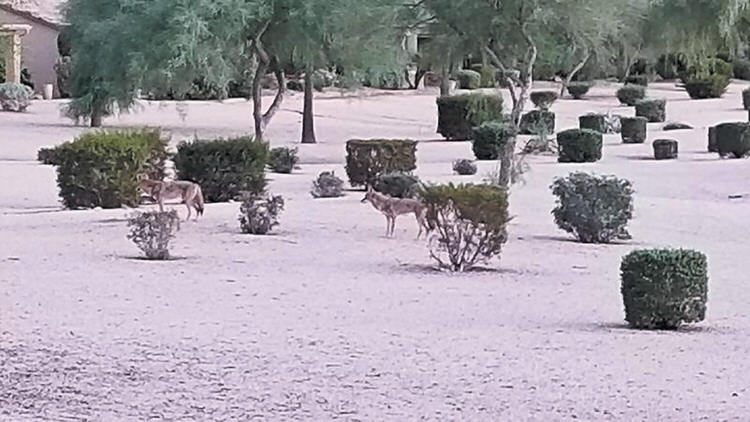 D. Rovers
D. Rovers
Living in Arizona has many perks—beautiful weather, amazing views, and wonderful people. Living the desert life does, however, have certain risks, and desert pet dangers are very real. If you are a pet owner new to the desert southwest, you need to know about the animals that pose a risk to your pets and follow some simple guidelines to help prevent them from becoming prey to these common predators.
Coyotes: Coyotes hunt nocturnally in packs; however, in Arizona you can see them at high noon on a blistering hot day, and they can and do attack anytime. Coyotes eat small desert animals like rabbits, which are abundant here in Arizona; however, coyotes are notorious for attacking cats and small, leashed dogs, so don’t put your small pet in a vulnerable position, such as leashed in the backyard. While doggie doors are a great convenience in other parts of the country, here in Arizona, eliminating the door is the safest for your small pets.
Birds of Prey: Red-tailed hawks, eagles, and great horned owls are all birds of prey that eat small rodents. These birds of prey pose the greatest threat to caged rodents like rabbits, hamsters, and gerbils. If you are caring for rabbits or other small animals, don’t keep the cages outside, especially at night. Owls are nocturnal, hawks can usually be seen circling the sky during the day, and vultures (as a general rule) don’t attack live animals—they prefer eating carrion (dead flesh). Great horned owls eat their prey whole.
Snakes: In Arizona we have 18 different species of rattlesnake, all venomous. As a general rule, snakes don’t hunt and eat small pets, since they can find abundant food sources in wild desert places. However, snakes often venture onto a back porch or under a parked car, and they naturally inhabit brushy areas in the desert itself. A rattlesnake bite can be lethal to a small, curious dog. Keep your dogs on a leash during walks in the desert. Did you know that there are “snake training” clinics in Phoenix that teach your dog to avoid snakes and, thus, prevent bites? For additional information, email zharvey@hssaz.org or call 520-327-6088, Ext. 138.
Mountain Lions and Bobcats: Mountain lions and bobcats are cats and have all the strength and agility you would expect of a large feline. While a fenced yard is a must, do not expect the fence to keep out a mountain lion or bobcat. Watch your pets and your small children carefully.
More than anything else, make sure your pet has a microchip implanted. Also, have your pets wear tags and collars with identification, including the pet’s name, contact phone number, and address. Stay vigilant. There have been many coyote sightings this year in the East Valley.
Rover’s Kids would love to visit with all of you at their second Saturday of the month Meet & Greets! For more information, call 480-600-2828.
